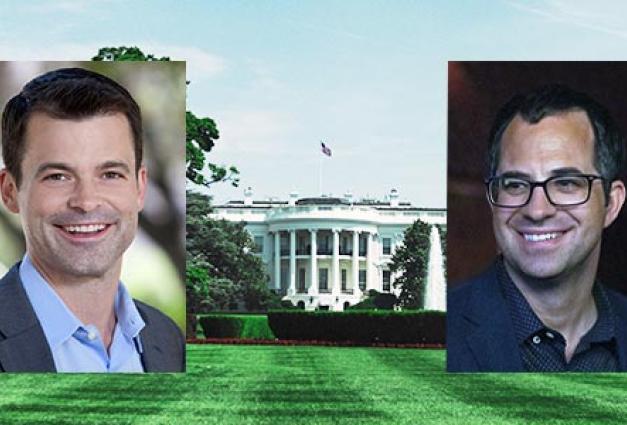In today’s political landscape, it’s not uncommon to hear about conspiracy theories or the rise of extremist groups around the world. But why do people adhere to conspiracy beliefs or join extremist groups? To learn more, we interviewed Anni Sternisko, a PhD candidate at New York University who researches conspiracy groups, and Dennis Estrada, a graduate student at Humboldt State University who researches the rise of extremist groups.
What makes conspiracy theories or extremist groups attractive to people?
Anni Sternisko (AS): Conspiracy theories respond (with varying degrees of success) to fundamental human needs such as people’s desire to make sense of the world. In a recent article, we argue that what makes conspiracy theories alluring might vary from person to person and situation to situation. Someone who wants to feel unique might be drawn to conspiracy theories primarily because they are unconventional beliefs (e.g., flat earth conspiracy theory). Others might be primarily attracted to conspiracy theories because they provide simplistic and definite answers to complex questions and events (e.g., climate change is a hoax).
It is important to note that not all conspiracy theories are irrational or wrong. Many conspiracy theories turn out to be true (e.g., the Tuskegee experiment). We are all conspiracy theorists to some extent, which is good as it encourages critical engagement. Beliefs in irrational and false conspiracy theories, however, go beyond “healthy wariness” and emerge from a unique composition of individual predispositions, motives, and context.
Dennis Estrada (DE): I would argue that uncertainty is a significant contributor to the rise of extremist groups in the United States and perhaps around the world. Uncertainty regarding our attitudes and beliefs can be triggered by something as simple as a snide comment from a friend or a conflict 1,000 miles away. With the nature of uncertainty, individuals are motivated to reduce their uncertainty as quickly as possible and by any means necessary. Previous research suggests that joining a group is an effective way of reducing uncertainty, as groups provide blueprints (i.e., prototypes) that individuals can adhere to. Individuals are given this prototype, that essentially tells them how to think, feel, and act, leaving little to no room for any self-doubt.
However, just because we experience uncertainty doesn’t mean we’ll automatically become an extremist overnight. There are various factors that contribute to the likelihood of joining an extremist group at an individual level (e.g., a perception of lack of control) and group level (e.g., goals, social structure).
It appears that certain conspiracy groups or extremist groups are becoming part of the mainstream culture. Why is this?
AS: It is important to distinguish between an increase in attention to conspiracy theories and an increase in the belief in conspiracy theories. Unfortunately, there is little research on how either attention or belief change over time. Some historical and polling data from the US suggest that the prevalence of belief in conspiracy theories remained fairly stable over the past century. What we perceive as an overwhelming expansion of conspiracy theory beliefs might actually just reflect a rampant increase in media coverage. In fact, some of the statistics reported by the media about the prevalence of certain conspiracy theory beliefs are based on flawed methods.
With this in mind, we see that certain conspiracy theories are currently occupying significant space in the public discourse (e.g., COVID-19 conspiracy theories, Europe’s Generation Identity). There are many reasons as to why this might be the case. The world has been undergoing significant economic and societal changes and was just hit by a pandemic.
People are anxious and uncertain. Many feel left behind and alienated from certain groups, or even society at large. In these situations, people latch onto conspiracy theories. I speculate that conspiracy theories that address society’s most prevalent concerns are most likely to go viral. Additionally, social norms around the dissemination of conspiracy theories have shifted. Even elite public figures have been publicly entertaining conspiracy theories. This can further push conspiracy theories into the mainstream.
DE: I believe we can understand why extremism has entered the mainstream by examining research on what prompts extremism itself. Research by Arie Kruglanski suggests that the underlying reason behind individuals joining and acting on behalf of extremist groups may be due to individuals seeking a higher purpose and meaning in life. Research by Arron Kay suggests that individuals are more likely to seek out ideologies that espouse high degrees of personal control when they feel powerless. The unifying theme in research on extremism is that fear and a longing for purpose, manifested in different forms, motivate individuals to seek out ideologies and groups that reaffirm their purpose and reduce sentiments of fear. I’d thus argue that extremist groups are becoming part of the mainstream discussion reflects the fear and longing for purpose that is currently being experienced by people around the world.
Are there ramifications for these beliefs entering the mainstream culture?
AS: I believe that the prevalence of (false) conspiracy theories in public discourse poses a serious threat to the individual and to society at large. For instance, research found that conspiracy theories motivate engagement in violent and criminal actions. In fact, the FBI recently labeled QAnon as a domestic terrorism threat. Conspiracy theory beliefs are also associated with hostility towards minorities, discrimination, and diminished intentions to vaccinate or reduce one’s CO2 footprint. Growing (albeit correlational) evidence also suggests that conspiracy theories may play a crucial role in the COVID-19 pandemic. For instance, my colleagues Jay Van Bavel, Aleksandra Cichocka, Aleksandra Cislak, and I found that people who believe more strongly in COVID-19 conspiracy theories report less engagement in physical distancing and physical hygiene and are less supportive of public-health policies aiming to contain the pandemic.
DE: The mainstream acceptance of extremism and extremist groups will have ramifications at all levels of society. For example, at the individual level we might see uncertainty become a new constant in people’s lives. Extremist ideology and groups, now more in the mainstream, may be seen as more legitimate and thus as a more viable option for reducing this uncertainty. This then leads us to ramifications at a broader social level, where the pro-normative messages that extremist groups offer may push discussions and individuals further to the left or right of the political spectrum. In short, I would expect to see the polarization of sociopolitical ideologies and parties in the mainstream arena, as we’re currently beginning to see in the United States.
Is there research to suggest we can curb the spread of harmful conspiracy theories or extremist groups?
AS: Conspiracy theories are powerful beliefs that people are reluctant to abandon. Compounded by the fact that they are not falsifiable and tend to spread faster than true information, combating the spread of conspiracy theories turns out to be extremely difficult. Yet researchers have identified some promising strategies. For instance, exposing people to information that debunks a conspiracy theory can prevent later adoption. Relatedly, cultivating critical media engagement can reduce the spread of misinformation. Eradicating conspiracy theory beliefs once they are established is hard, but not impossible. For instance, research suggests that a respectful, continuous, fact and logic-based discourse can uproot false beliefs. One of the most fruitful strategies to combat conspiracy theory beliefs may be to meet the underlying needs that drive people towards conspiracy theories initially. Can we find ways to affirm that everyone is a special and valuable member of our community? How can we ensure people’s voices are being heard? How do we restore and strengthen inter-personal trust? Can we find ways to mitigate a hostile narrative of us vs. them? Finding answers to such questions will be crucial in fighting conspiracy theory beliefs and misinformation.
DE: Yes! Arie Kruglanski has done some incredible work regarding curbing the spread of extremism and even deradicalizing extremists around the globe. Deradicalization can be defined as a process through which extremists slowly re-adopt a sense of normalcy by gradually loosening their commitment to their (extremist) ideology and the use of violence to achieve their goals. At the individual level, Kruglanski suggests that shifting the belief that violent extremism is morally justifiable and acceptable to unjustifiable and unacceptable, can loosen the grip of extremist ideology on individuals. At the social level, established deradicalization programs in Sri Lanka have found success in curbing extremism by focusing on dismantling the strict hierarchy in extremist groups. By separating leaders and followers, one thus dismantles the group’s structure, its prototype and entitativity, and allows the possibility of breaking through the echo chamber that is present in extremist groups. This in turn gives extremist members the option to turn away from the extremist ideologies without repercussions or a support system to fall back on.
Special thanks to Anni Sternisko and Dennis Estrada for answering our questions. Responses have been modified for brevity and grammar.




